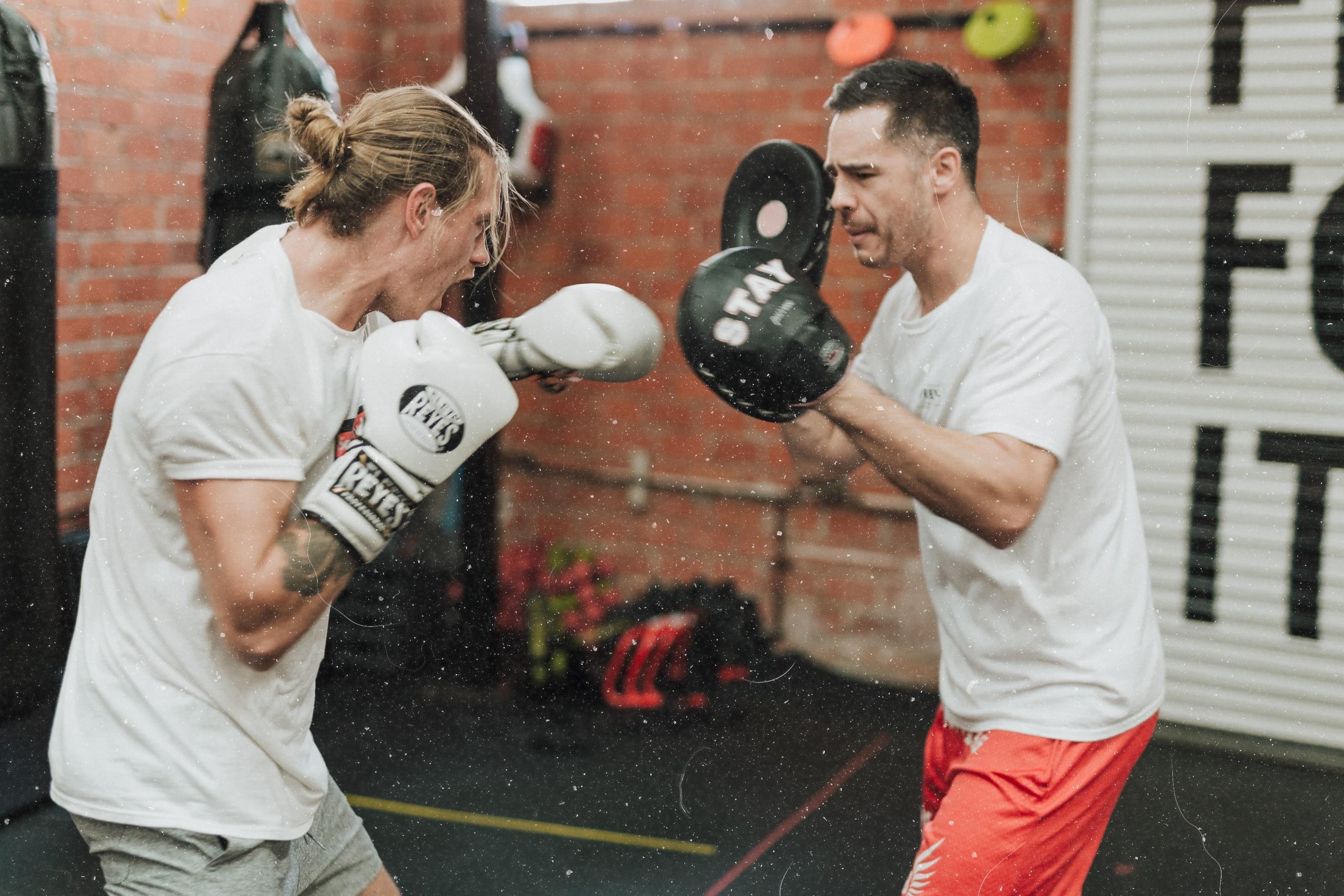
CLAIM YOUR book your free trial consultation!
Take the first step towards change. Claim your spot for the book your free trial consultation today!

Partners are an unavoidable aspect of being a Krav Maga practitioner. Self-defense, in reality and in practice, requires an attacker and a defender, making our training dependent on partner training for much of our skill work. Our partner for class can make or break our training. I have had several classes where I felt like I crushed the skills that day, and I can thank my partner, in part, for those days because that person was a good feeder. I can also think of several days where I had a terrible class. Granted, most of that is on the mindset walked into class with or in the way that skills clicked (or didn’t click). But some of that can also be on the partner. If I have a partner that doesn’t listen or isn’t a good feeder (more of that below), my training takes a hit, as does all of yours.
We’re learning how to be a good partner here just as much as we are learning how to defend ourselves. Being a good partner is especially critical in upper levels where how well you defend a skill relies on how well your partner can aim a punch at your face. That’s why your skills as a partner are graded as well as your techniques during belt tests. It matters for you and for the people you train with. The tips I’m about to go over may seem like common sense, but I still think they are worth pointing out as a reminder.
Pay attention to the instructor.
It’s up to you to know what the instructor expects of you during an exercise or skill. If you’re not sure, ask a question. Please say something if what the instructor is going over does not look familiar. Everything we do here is set up to prevent injury. If you are not listening to the instructions, particularly for the safety in training part, you could hurt yourself or your partner. Additionally, you won’t know what’s going on which requires your partner to get you up to speed. It takes away from both of your training time. Pay attention. Ask questions. Attend class with the expectation that you are going to put your best effort forward. That effort becomes more difficult to maintain if you’re not paying attention to the instructor. You should be paying more attention as the techniques gets more technical, even if you have seen the skill before. You may learn something new that you had not heard before.
Safety in training is more than how to hold the pad and avoiding the mirrors in the
classroom.
There is a huge potential for injury in what we do. That’s partly why we are all here; we want to protect ourselves and others from serious harm if the situation ever arises, and we need to know how to inflict harm if it helps us achieve that. Part of training effectively and being a good partner is not injuring your partner. I don’t just mean not hitting them in the face. I mean understanding that holding the pad incorrectly could hurt your partner or that not paying attention to what hits you are throwing could hurt your partner. In general, the students at our gym do an excellent job of being careful during class. However, it’s easy to get comfortable and lose a bit of control as well.
Granted, sometimes there are injuries we can’t help. I got a concussion last June because I didn’t tuck my chin and bobbed right into a hook. That was my fault. I learned from it. I’m more cautious of how I move in sparring now. However, getting kneed in the groin several times over the course of six months is not my fault. That’s on my partner(s). We have to maintain a certain level of control and awareness when we are throwing combatives. We want you to let the combatives follow through (fully extending groin kicks, punching past the head, making light contact to the body, etc), but it’s on you to make sure you are doing the technique correctly while also pulling back enough to not take your partner down in class.
The concussion and the groin shot (that prompted buying a cup) were my two worst injuries with partners so far (in two years of training). The concussion incident was an honest mistake. My partner felt terrible, but I just moved wrong. It happens, but thankfully rarely to the extent that it results in a concussion. The groin shots, however, are not because I moved wrong. In those cases, I was standing still letting my partners do a technique and finish with combatives. Those combatives slipped through. There wasn’t enough control. Those do happen, but they shouldn’t. Being a good partner here means knowing how much control is going to allow you to do the technique with the intensity and aggression the instructors are looking for without injuring your partner. This is a learning curve; we have all had to adjust our training styles to fit this reality. However, remember that the learning curve should not take months. If your partner(s) gets hurt to some degree frequently when they partner with you, the issue is not with them. The issue is with you. Change how you train accordingly.
Vary your training partners.
One of the great things about doing Krav Maga is that we can train with a range of sizes, builds, ages, strengths, and fighting styles. You will be a better practitioner if you train with variety of people. I try to partner with the biggest person in the class at least once per class. Sometimes I’ll partner with them for the whole class. Varying your partners helps you familiarize with different kinds of body language. It’s easy to get comfortable with one person and their body language, and then get thrown off when you partner with someone new. Mix up your training routine occasionally and train with someone different. Your training will change much more than you think.
Don’t underestimate your partner.
Like I said, we have a wide range of individuals at our gym. This one should go without saying, but don’t underestimate any of the people who train at KMS. Regardless of your first impressions or whatever background you may come from, everyone there is learning to kick ass, and given the opportunity, a lot of students there could. You don’t do yourself or your partner any favors by walking into a exercise thinking they are weak or timid or slow. Everyone at our gym deserves the opportunity to learn these skills. You compromise their training by believing they are unequal.
Be a good feeder.
Sometimes we need a little extra push to give more effort into class that day. As a partner, you have to ability to make or break someone’s training day. Being a good feeder means encouraging your partner. Again, we test on it. It’s that important to our day-to-day training. I have participated in shark bait drills when the majority of the group is silent. Getting through those few minutes is difficult on its own but it is doable when peers are encouraging you to push through. It’s not as doable if the entire group is attacking you silently. The same applies to our usual partner setup. Having a partner that is supportive and encouraging through class improves how well you do in class.
However, encouragement is a small component of being a good feeder. It’s the little things like knowing how to use the pad properly, or choking your partner around the throat, not the shoulders. (You’re not doing anyone any favors by “choking” your partner with your hands resting mostly on their shoulders). There’s also communicating with your partner. Talk about adjusting pads or when they are doing something that isn’t working for you. Tell your partner to lighten up. Tell them they can go harder. Find something positive to say about the technique they just did.
Most importantly, push each other with your level of effort. Finding a partner that pushes you creates such a positive impact on your training. Encouragement doesn’t always have to be verbal. Encouragement can be shown through matching the level of effort your partner is putting into the skill. Some of my best classes were when I was with someone that encouraged me to match their aggression or effort, and they did the same. It’s challenging for both of you, and that makes training more beneficial.
Don’t self-teach.
For those that may not be familiar with this term, in this context, self-teach means giving your partner advice about their techniques during class, often to the point of altering their technique. All of the instructors at KMS ask that you NOT self-teach with your partner, even if you have been there for a while or you are paired with a new student. For one, the advice you give to your partner may not be the advice they need or it could be incorrect advice. You may tell them to change something that you are also doing incorrectly. Our instructors have gone through this training for a reason. They know what they are talking about, and they will address the biggest technical issues with students as they make their rounds.
There’s a difference between asking your partner to let you know if you keep doing something (dropping hands, flattening your back foot, keep your chin elevated, etc), and giving them technical feedback. The former is a training reminder from your partner of something you know you need to work on and have asked to have pointed out. I will do this if I know I’m not tucking my chin or keeping my hands in front of my face that day. It’s something I am asking my partner to help me correct by pointing out when I do it. The latter is teaching from someone that isn’t trained to do it, even if you think you are being helpful. It is not your job as a student to correct other students’ techniques, unless they are doing something that could actively hurt you. If your partner is having trouble, ask an instructor to help. It is better for them in the long run. Self-teaching can also be disrespectful to the instructor of that class. Again, they know what they are doing. Let them do it.
We can all be a good partner. It takes a bit of time to adjust to each person you partner with, but the ways to be a good partner are consistent. It’s hard partnering with someone that doesn’t listen or pull their weight. You will both have a better class if there is as much effort in being a good partner as there is in the work itself. Our training regime at KMS will always require training with other people. We can’t get around it, and it can be hard to avoid certain people as partners. It’s in everyone’s best interests to make this as much of a priority as anything else we do during class. If you take anything away from this post, let it be to treat your partners the way you want to be treated. We are all here for the same training. Treat each other with respect and consideration.

Mon-Fri: 10am-1pm / 4pm-7pm Sat: 9am-12pm Sun: CLOSED
Copyright - Krav Maga Spokane
Privacy Policy - Terms & Conditions
This website is not a part of Facebook or Facebook Inc.
Additionally, this site is not endorsed by Facebook in any way. FACEBOOK is a trademark of FACEBOOK Inc.